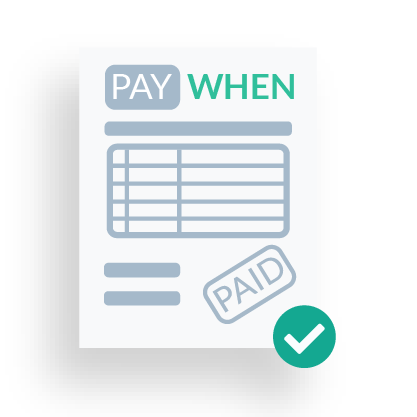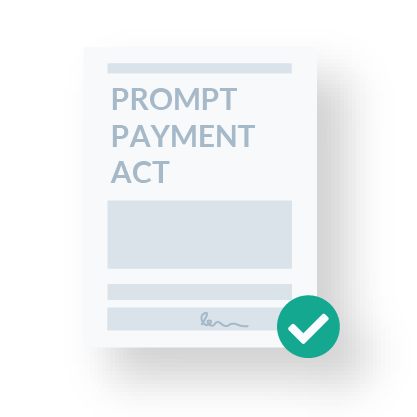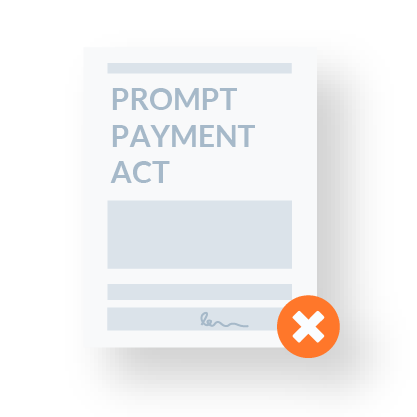Colorado Construction Contracts
- Private Jobs
- Public Jobs
- Top Links
Lien Rights Can Be Waived By Contract
Colorado is one of a few states that specifically allow parties to waive lien rights by contract prior to furnishing labor or materials.
Pay-If-Paid is Enforceable
Colorado allows pay-if-paid clauses to be enforceable as a condition precedent to payment, and bar payment completely when payment not received from above if the clear and unambiguous intent of the parties is for the particular clause to be a risk-shifting device.

Pay-When-Paid is Enforceable
Pay-when-paid clauses are enforceable in Colorado, but only sets a reasonable time for payment, the obligation to pay still exists; regardless of receipt of payment.

Prompt Payment Unregulated
Colorado does not have prompt payment regulations related to private projects. The time for payment is set forth by contract.

Retainage Unregulated
Colorado does not specifically regulate retainage on private projects. Accordingly, retainage is governed by the contract between the parties.
Pay-If-Paid is Enforceable
Colorado allows pay-if-paid clauses to be enforceable as a condition precedent to payment, and bar payment completely when payment not received from above if the clear and unambiguous intent of the parties is for the particular clause to be a risk-shifting device.

Pay-When-Paid is Enforceable
In Colorado, pay when paid provisions on public projects can be treated as pay if paid provisions and set receipt of payment from above as a specific condition precedent to payment, but only if they are very specifically clear. Unclear or ambiguous pay when paid provisions are treated as a timing mechanism and merely require payment to be made within a reasonable time.

Payment Timing May Not Be Modified
On public projects in Colorado, payment must be made to subs and suppliers within 7 days of the receipt of payment from above. Payment to GCs is due by "the end of each calendar month or as soon thereafter as practicable"

5% Maximum Retainage Withheld
Colorado limits retainage on public projects to 5% of the contract price, and requires that the retainage can be held by the public entity until the contract is completed and the project is accepted by the public entity. After contractors receive retained funds they must pay subs within 7 days.
A construction contract outlines each party’s obligations, rights, and remedies on a project. But although the language in specific contract clauses is typically negotiable, Colorado has certain rules that govern what the agreement must include — and what is prohibited.
Keep in mind that, while Colorado’s rules for construction contract terms are written into state law, the courts determine how strictly those laws should be interpreted — and those interpretations can change.
On this page, you’ll find resources, legal information, and answers to frequently asked questions about Colorado’s construction contract and payment terms requirements.
Colorado construction contract provisions
While Colorado generally allows construction parties to set the terms of their agreement, there are some laws that regulate specific types of contract provisions. Any contract clause that contradicts the law is invalid and unenforceable.
“No lien” clauses
Colorado’s mechanics lien law specifically prohibits the use of “no-lien clauses.” Any term in a construction contract that attempts to waive or impair a party’s claims or liens, shall be void and unenforceable.
Contingent payment clauses
There are two types of contingent payment clauses: pay-if-paid and pay-when-paid, both of which are enforceable under Colorado law.
In order to have a valid pay-if-paid clause, the provision must explicitly and unequivocally state that the party will only be paid when the paying party received payment from the higher tier, and the risk of nonpayment is being shifted. If the provision fails to meet these requirements, then it will be treated as a pay-when-paid clause. Such clauses only require payment to be made within a reasonable time, the party is still obligated to pay whether payment has been received or not.
• See: Colorado Pay-if-Paid & Pay-When-Paid Clauses
Payment timing clauses
Colorado’s prompt payment laws only apply to public projects, private projects are generally unregulated. Therefore, on private projects, the timing of payments and interest penalties will be set forth by the terms of the contract.
On public works projects in Colorado, the prompt pay laws require progress payments to be made by the public entity at the end of each month (or soon thereafter as “practicable”); final payment within 60 days of completion and acceptance. All other payments down the contracting chain must be made within 7 days of receipt. The only aspect of the prompt pay laws that may be changed by the contract is the interest rate for late payments to subcontractors and suppliers. Interest accrues at a rate of 15% per year, or the rate stated in the contract; whichever is higher.
Retainage limits
Currently, Colorado does not have any retainage limits on private construction projects, so the amount that can be withheld and the interest penalties will be determined by the terms of the contract.
On public projects in Colorado, the amount of retainage withheld is also capped at 5%, and cannot be modified by an agreement between the parties.
• See: Colorado Retainage Law | A Guide to Public Projects
Colorado construction contract requirements
Colorado doesn’t have any specific, statutory requirements for construction contracts. Generally, there are always certain provisions that should be included in a contract, such as a price, schedule, the scope of work, etc.
• See: A Guide to Common Construction Contract Parts
However, there are some specific requirements for residential roofing contracts under Colo. Rev. Stat. §6-22-103. This includes provisions outlining the scope of services and materials, approximate cost based on damage known at the time of contracting, the owner’s right to rescind the contract, and the contractor’s surety and liability coverage insurer, to name a few.

